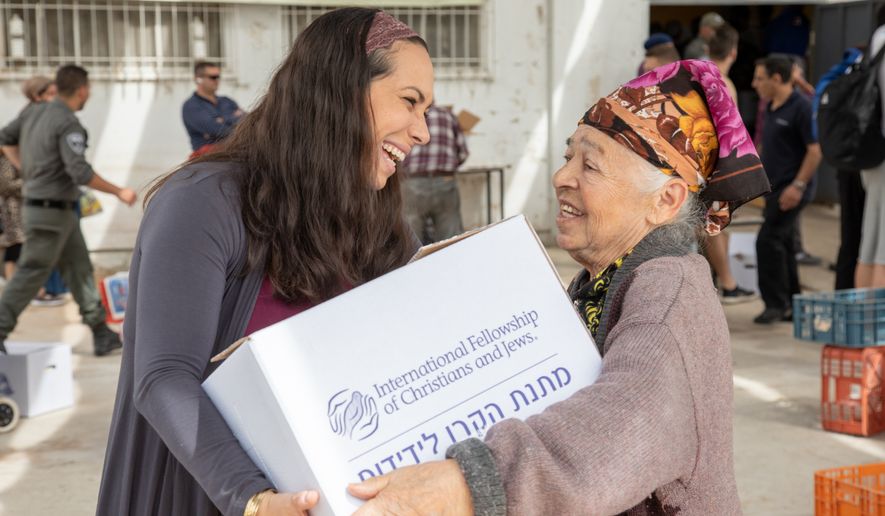Heart-tugging fundraising appeals highlighting the plight of poor Jews in Israel and the former Soviet Union have raised tens of millions of dollars from American Christians, making the International Fellowship of Christians & Jews a nonprofit powerhouse.
The Fellowship, as the group styles itself, raised $118 million in 2019 using direct mail, television spots and program-length “infomercials,” according to the group’s IRS filing for that year, the latest available. Media reports indicate the group has raised more than $1.5 billion for Jewish charitable work since its founding and claims to be the largest nongovernmental philanthropic organization in Israel.
The 38-year-old charity has helped thousands of Jews emigrate from Ukraine and elsewhere, delivered food packages to aged Holocaust survivors in Israel and the former Soviet Union, and constructed more than 5,500 bomb shelters in Israel, many of which were used during the recent 11-day onslaught of Hamas-backed rocket attacks as Israeli and Palestinian forces clashed.
Yael Eckstein, 37, married and a mother of four, leads the Chicago-based group from her base in Jerusalem. She became president and CEO after the death of her father, Rabbi Yechiel Eckstein, in 2019 at age 67, two years before his intended retirement.
“In no way was I groomed for this,” Ms. Eckstein, a one-time teacher in New Jersey, said in a recent interview. “My father would always joke that, ‘You’re going to be the lawyer who makes a ton of money,’ and I said, ‘I want to be a veterinarian that saves animals’ lives.’ And in the end, I’m here.”
Ms. Eckstein grew up in Skokie, Illinois, a Chicago suburb, and spent her senior year of high school in Israel. She roomed with a New Yorker who planned to attend Queens College in the fall. On an impulse, Ms. Eckstein decided to attend the school with her new friend and ended up living in the New York City borough, where she met the man who became her husband in June 2005.
The couple — she doesn’t use her married name “for security reasons,” Ms. Eckstein said — emigrated to Israel, where Ms. Eckstein began a hands-on apprenticeship in the Fellowship’s Israeli offices. She started in the mailroom, where she affixed postage to thank-you letters to donors. Her connections with supporters continued, and The Jerusalem Post asked her to write for its website. Her father and the Fellowship’s board saw the value of her work and eventually tapped her to succeed Rabbi Eckstein.
Nontraditional path
No one imagined it would be as soon as it was. After the seven-day period of mourning known in Hebrew as “shiva,” Ms. Eckstein had to reflect on what lay ahead.
“We followed a very nontraditional path when it came to transitioning” leadership, Ms. Eckstein said. “I didn’t go to courses and different things for the transition. My father never sat down with me and opened the books and said, ‘This is what you need to know, my daughter, in order to lead the organization.’”
One part of that leadership is helping donors understand that pockets of poverty endure in segments of Israel despite the 73-year-old nation’s reputation for excelling in business, especially technology. Not every Israeli has benefited from the country’s economic successes, Ms. Eckstein said.
“What the Fellowship is saying isn’t that this is the most poverty-stricken country in the world and we need this help because we’re worse than anyone else,” she said. Instead, giving is positioned as “a spiritual opportunity.”
The gap between the rich and poor in Israel is huge, Ms. Eckstein said. Many of those older than 80 came to Israel with little or no resources or savings. Each receives $500 a month from the government and no more. The Jewish state doesn’t have the equivalent of the U.S. Supplemental Nutrition Assistance Program, commonly known as “food stamps.”
“And for $500 a month in Israel, I want to see anybody try to live and be able to thrive,” Ms. Eckstein said.
“Those are the people that we’re targeting specifically,” she said. “We’re bringing them food, we’re finding elderly who meet that criteria, we’re coming to them and saying [that] the Fellowship is going to bring you food every single week for the rest of your life.”
Eli Beer, president of United Hatzalah of Israel, a charity that speeds emergency assistance by placing workers on motorcycles equipped with medical supplies, has worked with the Fellowship and the Ecksteins. He said the rabbi’s daughter is a worthy successor.
“I think Yael is filling her father’s shoes so wonderfully,” Mr. Beer told The Washington Times via email. “She has taken on the role with such passion and dedication, and she has brought in many new supporters and partnerships with amazing organizations.”
Asked about Israeli reaction to a group that raises most of its money from non-Jewish donors, Mr. Beer said, “I think their involvement is very positive. People love what IFCJ is doing. They are making it easy for people who love Israel and want to support the country by giving them different opportunities to make a change on the ground. Israelis think very highly of IFCJ and especially of Yael.”
• Mark A. Kellner can be reached at mkellner@washingtontimes.com.




Please read our comment policy before commenting.